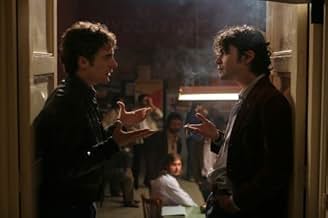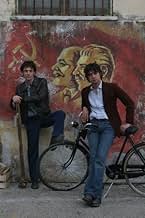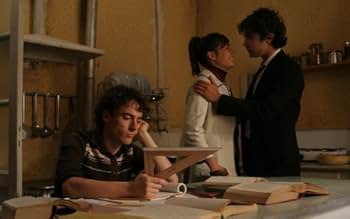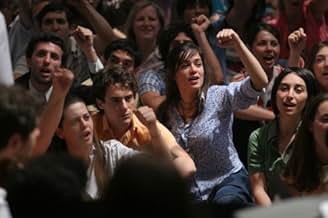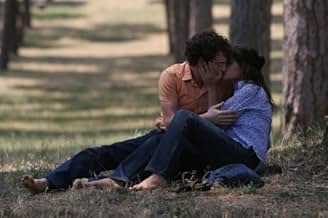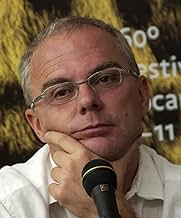IMDb-BEWERTUNG
7,0/10
6871
IHRE BEWERTUNG
Füge eine Handlung in deiner Sprache hinzuTwo brothers come of age in a small Italian town in the '60s and '70s.Two brothers come of age in a small Italian town in the '60s and '70s.Two brothers come of age in a small Italian town in the '60s and '70s.
- Auszeichnungen
- 19 Gewinne & 29 Nominierungen insgesamt
Antonino Bruschetta
- Segretario Bombacci
- (as Ninni Bruschetta)
Empfohlene Bewertungen
Luchetti's film ('Il mio fratello è figlio unico') goes from the Sixties into the Seventies in Italy following two brothers from a communist working-class family. Accio Benano, the rebellious younger one, who drops out of seminary very quickly, gives in to the constant indoctrination of a much older bus driver pal named Mario (Luca Zingaretti) and joins the fascist party. Then he falls in love with Francesca (Diane Fleri), the girlfriend (the first of a series) of his Lothario older brother Manrico (blue-eyed dreamboat Riccardo Scamarcio). Manrico becomes a leftist leader in '68 and moves on to terrorist activities in the Seventies. Accio's black-shirt cohorts cause their share of bother too, of course, but they are depicted as both inept and betraying Accio's confidence. Eventually the latter realizes he's a leftist too at heart. (He only adopted fascism because he wanted to be contrary.) This change in Accio comes almost in time to save Manrico from big trouble.
It took me a while to adjust to the shift in actors when Accio goes from early to late teens. No doubt Elio Germano was an inevitable choice for the older Accio because of his sweet, ironic presence: he's a lovely actor. But the younger actor, Vittorio Emanuele Propizio, and the incidents Accio's involved in early on, project a spirit of fun and craziness that I missed thereafter. In fact, the promise of the early sequences gets dissipated in what becomes an increasingly plodding (and overly telescoped) series of events as Accio's and Manrico's politics, love lives, and family involvements criss-cross over the years.
Reports from those who've read Antonio Pennacchi's amusingly titled novel 'Il fasciocommunista' say the movie lightens things up, but Sandro Petraglia and Stefano Rulli, who collaborated on the screen adaptation, seem to have gotten bogged down and too literally followed the story after those light-hearted and promising beginnings. Mind you, Petraglia and Rulli are no slouches: they also scripted the recent 'Criminal Romance' (veteran actor Michele Placido's 2005 directorial debut, which also features Scamarcio) as well as the highly successful theatrically released TV miniseries 'The Best of Youth,' whose decade-sweeping plot this film's somewhat echoes.
A memorable set piece shows Manrico introducing a '68 reworking of Beethovan's 'Ode to Joy' with revolutionary lyrics. During the performance Mario's fascist hooligans move in, and their targeting his own brother leads to Accio's final break with the right.
The family's base is Latina, a town created by Mussolini south of Rome, which makes an ever-present reminder of heavy Italian legacies. Mario represents the element who refuse to erase or forget the nation's fascist past. He argues (among other things) that there's a worthwhile legacy of architecture. Indeed fascist architecture does have a certain kitsch charm one ought not reject too easily; and an inability to come to terms with the fascist past is surely one of the main reasons for Italy's muddled self-image. This story is a stab at dealing with that psychological issue in a healthy way.
'My Brother Is an Only Child,' which was rejected by the Cannes jury for Official Entry status, lacks the fluidity of Gabriele Muccino's 'Io come te nessuno mai' (which, though very different, comes to mind for its blending of coming of age, family conflict, and politics) but it has a kind of vernacular vigor. It's true, Italian cinema continues to go through a largely lackluster period, and Italian film-goers appear to have been bitterly disappointed with Luchetti's latest. That's a bit of a shame, because there is a lot of charm and humanity here, and for anyone interested in Italy and its modern history, this should be required viewing.
Seen during a limited run in Paris, October 17, 2007.
It took me a while to adjust to the shift in actors when Accio goes from early to late teens. No doubt Elio Germano was an inevitable choice for the older Accio because of his sweet, ironic presence: he's a lovely actor. But the younger actor, Vittorio Emanuele Propizio, and the incidents Accio's involved in early on, project a spirit of fun and craziness that I missed thereafter. In fact, the promise of the early sequences gets dissipated in what becomes an increasingly plodding (and overly telescoped) series of events as Accio's and Manrico's politics, love lives, and family involvements criss-cross over the years.
Reports from those who've read Antonio Pennacchi's amusingly titled novel 'Il fasciocommunista' say the movie lightens things up, but Sandro Petraglia and Stefano Rulli, who collaborated on the screen adaptation, seem to have gotten bogged down and too literally followed the story after those light-hearted and promising beginnings. Mind you, Petraglia and Rulli are no slouches: they also scripted the recent 'Criminal Romance' (veteran actor Michele Placido's 2005 directorial debut, which also features Scamarcio) as well as the highly successful theatrically released TV miniseries 'The Best of Youth,' whose decade-sweeping plot this film's somewhat echoes.
A memorable set piece shows Manrico introducing a '68 reworking of Beethovan's 'Ode to Joy' with revolutionary lyrics. During the performance Mario's fascist hooligans move in, and their targeting his own brother leads to Accio's final break with the right.
The family's base is Latina, a town created by Mussolini south of Rome, which makes an ever-present reminder of heavy Italian legacies. Mario represents the element who refuse to erase or forget the nation's fascist past. He argues (among other things) that there's a worthwhile legacy of architecture. Indeed fascist architecture does have a certain kitsch charm one ought not reject too easily; and an inability to come to terms with the fascist past is surely one of the main reasons for Italy's muddled self-image. This story is a stab at dealing with that psychological issue in a healthy way.
'My Brother Is an Only Child,' which was rejected by the Cannes jury for Official Entry status, lacks the fluidity of Gabriele Muccino's 'Io come te nessuno mai' (which, though very different, comes to mind for its blending of coming of age, family conflict, and politics) but it has a kind of vernacular vigor. It's true, Italian cinema continues to go through a largely lackluster period, and Italian film-goers appear to have been bitterly disappointed with Luchetti's latest. That's a bit of a shame, because there is a lot of charm and humanity here, and for anyone interested in Italy and its modern history, this should be required viewing.
Seen during a limited run in Paris, October 17, 2007.
This film is a dilemma for me. The first half just bounced along. The music was perfect. The energy pulled me along with it, seeing what felt to me like real people's insight into the serious subject matter. Interesting subject matter, interesting characters with motivation, who I cared about. You do laugh at things, even when serious stuff is going on most of the time. I didn't think it could get any better.
And then in a blink of an eye (about an hour in, maybe), it all went to pieces. It dawdled slowly through clichés. I felt like I knew what was coming, and I didn't even care. It was implausible, and at times boring enough for me to lose concentration.
Part of the problem is that it is (as another reviewer noted) about 20 minutes too long. How come are there film directors - talented ones - who haven't yet noticed that 90 minutes is generally enough? 8/10 for the brilliant first half.
And then in a blink of an eye (about an hour in, maybe), it all went to pieces. It dawdled slowly through clichés. I felt like I knew what was coming, and I didn't even care. It was implausible, and at times boring enough for me to lose concentration.
Part of the problem is that it is (as another reviewer noted) about 20 minutes too long. How come are there film directors - talented ones - who haven't yet noticed that 90 minutes is generally enough? 8/10 for the brilliant first half.
The first 30 minutes or so made me hope for the best. Elio Germano is an actor with an extraordinary power to grab his audience and make us care, plus, the film seemed to move away from the (very good) book it is based on and go for the most engaging comedic aspects of the story. I knew it was too good to be true. Shortly after the film falls in a series of common places robbing us from the possibility to be surprised, engaged or even care. I wonder why it is that we - in Italy I mean - feel the need to visit the past though the same identical paths. To tell you the truth, I'm sick and tired of it. Can we tell stories that live out of its own strength. Politics, intellectual reflections without any, real, base on reality. We are known for protesting at a bar table, maybe go to a demonstration but at the end of the day we are going to do what we're told. Honestly or dishonestly. Could it be that, this relentless film revisions, is a tacit way to justify the fact that we've been so ineffectual in real life. We've been through everything and more but nothing has really changed. We're better identified by the Alberto Sordi characters like the one in "La Grande Guerra" by the great Mario Monicelli. My question is: If I, as an Italian, couldn't care less about the political mismatch of two Italian brothers, imagine the rest of the world. How confusing and ultimately annoying way to tell a story. There was a sort of uproar today, knowing that this film had not been selected for the official selection at the Cannes Film Fest. Hey, come on, think again. Why should it be? There is absolutely nothing new in it. Nothing! Riccardo Scamarcio continues to sleep walk through his film roles. He is beautiful but not nearly as magnetic as Elio Germano. I hope we'll wake up soon and realize that we won't change the past by revisiting it. That we are who we are and should look ahead to see what happens.
Good Italian movies are few and far between – the last I saw was Zefferelli's "Tea with Mussolini", and before that, "Life Is Beautiful". It seems that Italian movies, good or bad, are rare. If the list in Wikipedia is anything to go by, Italy produces about ten to fifteen features a year, far less than Australia.
This one is about growing up in a post-Mussolini, post-war world as a working class Italian. The narrator, Accio (Elio Germano), bright but temperamental, is not the most pleasant of people (his name means bully). At 13 he is sent off to a seminary by his long-suffering and pious parents but even though it's a fairly humane regime he doesn't last long. So it's back to the family's tiny, crumbling flat to grow up with his older brother, Manrico (Riccardo Scarmarcio). Rejecting religion, Accio comes into the orbit of the local fascists, though he is more interested in action than ideology. The handsome, charming Manrico becomes a communist, and beds Francesca (Diane Fleri), an attractive middle class girl who has joined the comrades. Naturally Accio gets interested in Francesca as well.
The story covers the period 1962 to 1968 and plenty of reference is made to the turmoil of the times, but basically it is about a textbook case of sibling rivalry. Acco and Manrico cannot keep their hands off each other – in order to fight, that is. Acco however does manage to reach some sort of maturity at the end.
The story moves along at a good pace and there are plenty of funny scenes. The best one is the occupation by the communist students during the 1968 disturbances of the Rome conservatory where they perform Beethoven's "Ode to Joy" with the words changed to communist slogans, and are then invaded by the fascists crying "Don't mess with Beethoven" (actually the original words were from a poem by Schiller). The switch of actors (Vittorio Propizio plays the younger Accio) is accomplished in a particularly neat fashion, using a method I last saw used in "Conan the Barbarian" where the older actor is substituted in mid-scene.
In the background is Mussolini's legacy, an angry, confused and humiliated nation without a clear sense of direction. His 1930's "new towns" like Latina on the Pontine marches, jerry-built and badly designed, were crumbling already by the 1960s. Replacement housing had been built but corrupt local officials were holding up its allocation. There is a very satisfying moment at the end of the film when Accio, no stranger to causing a ruckus, takes remedial action.
Not being Italian I probably missed a lot, but the film held my attention for its full length, despite Accio not being a particularly nice lad (then neither was Genghis Khan and he had an interesting life). The film is bright, fresh and fast-moving though I'm not sure about the climax, which is rather on the melodramatic side. If the Italians can bring themselves to make more movies of this quality, I'll come along to watch.
This one is about growing up in a post-Mussolini, post-war world as a working class Italian. The narrator, Accio (Elio Germano), bright but temperamental, is not the most pleasant of people (his name means bully). At 13 he is sent off to a seminary by his long-suffering and pious parents but even though it's a fairly humane regime he doesn't last long. So it's back to the family's tiny, crumbling flat to grow up with his older brother, Manrico (Riccardo Scarmarcio). Rejecting religion, Accio comes into the orbit of the local fascists, though he is more interested in action than ideology. The handsome, charming Manrico becomes a communist, and beds Francesca (Diane Fleri), an attractive middle class girl who has joined the comrades. Naturally Accio gets interested in Francesca as well.
The story covers the period 1962 to 1968 and plenty of reference is made to the turmoil of the times, but basically it is about a textbook case of sibling rivalry. Acco and Manrico cannot keep their hands off each other – in order to fight, that is. Acco however does manage to reach some sort of maturity at the end.
The story moves along at a good pace and there are plenty of funny scenes. The best one is the occupation by the communist students during the 1968 disturbances of the Rome conservatory where they perform Beethoven's "Ode to Joy" with the words changed to communist slogans, and are then invaded by the fascists crying "Don't mess with Beethoven" (actually the original words were from a poem by Schiller). The switch of actors (Vittorio Propizio plays the younger Accio) is accomplished in a particularly neat fashion, using a method I last saw used in "Conan the Barbarian" where the older actor is substituted in mid-scene.
In the background is Mussolini's legacy, an angry, confused and humiliated nation without a clear sense of direction. His 1930's "new towns" like Latina on the Pontine marches, jerry-built and badly designed, were crumbling already by the 1960s. Replacement housing had been built but corrupt local officials were holding up its allocation. There is a very satisfying moment at the end of the film when Accio, no stranger to causing a ruckus, takes remedial action.
Not being Italian I probably missed a lot, but the film held my attention for its full length, despite Accio not being a particularly nice lad (then neither was Genghis Khan and he had an interesting life). The film is bright, fresh and fast-moving though I'm not sure about the climax, which is rather on the melodramatic side. If the Italians can bring themselves to make more movies of this quality, I'll come along to watch.
MY BROTHER IS AN ONLY CHILD ('Mio fratello è figlio unico') is a title that may confuse the casual movie viewer, but it is an apt summation of the rigorous story that this excellent Italian film by Danielle Luchetti (adapted from a novel by Antonio Pennacchi) represents - the coming of age of two brothers in the confusing and turbulent 1960's and 1970's in Italy. While the film deals with the myriad political factions that disrupted life especially among the students of that era, the main focus of the story is the indomitable brotherly love that bonds the two main characters.
Accio Benano (Vittorrio Emanuele Popizo) as a child is a mischief maker who has entered seminary to become a priest, but his innate search for truth and meaning soon finds him returning home to his little family in a Mussolini-fabricated town called Latina, a village built on promises of communal well-being (a housing project was built but the poor villagers are refused access to it), but languishes in the poverty of lost hopes and deflated spirits. Accio's father, mother, younger sister and older brother Manrico (Riccardo Scamarcio) are making ends meet, but are frustrated with the political oppression of the working class. Time passes and the older Accio (Elio Germano) comes under the influence of Mussolini's 'idealism' with the tutelage of his older friend Mario (Luca Zingaretti) and embraces Fascism while Manrico has aligned with the communists, and it is this dichotomy of belief that sets Accio apart from his brother as well as his family who are communist sympathizers. Accio's personality places him in harms way with the law, with women (he has longings for the women in both Mario's and Manrico's lives), and ultimately with turns of events that threaten to pit brother against brother. The resolution of these conflicts makes for a fascinating study of familial ties, brotherly love, and a keenly observed sociopolitical history of Italy that is as enlightening as it is entertaining.
While Germano and Scamarcio are the obvious stars of this well acted film, the supporting cast (including such fine actors as Angela Finocchiaro, Massimo Popolizio, Alba Rohrwacher, Anna Bonaiuto, and Diane Fleri) is uniformly strong. This epic film demands full attention to the script (Italian with English subtitles) to follow the various political differences, but the tenor of the film is one of the excitement and concomitant love of two brothers coming of age in the best Italian style! It is a joy to watch and a lesson in history about which we should all be aware. Grady Harp
Accio Benano (Vittorrio Emanuele Popizo) as a child is a mischief maker who has entered seminary to become a priest, but his innate search for truth and meaning soon finds him returning home to his little family in a Mussolini-fabricated town called Latina, a village built on promises of communal well-being (a housing project was built but the poor villagers are refused access to it), but languishes in the poverty of lost hopes and deflated spirits. Accio's father, mother, younger sister and older brother Manrico (Riccardo Scamarcio) are making ends meet, but are frustrated with the political oppression of the working class. Time passes and the older Accio (Elio Germano) comes under the influence of Mussolini's 'idealism' with the tutelage of his older friend Mario (Luca Zingaretti) and embraces Fascism while Manrico has aligned with the communists, and it is this dichotomy of belief that sets Accio apart from his brother as well as his family who are communist sympathizers. Accio's personality places him in harms way with the law, with women (he has longings for the women in both Mario's and Manrico's lives), and ultimately with turns of events that threaten to pit brother against brother. The resolution of these conflicts makes for a fascinating study of familial ties, brotherly love, and a keenly observed sociopolitical history of Italy that is as enlightening as it is entertaining.
While Germano and Scamarcio are the obvious stars of this well acted film, the supporting cast (including such fine actors as Angela Finocchiaro, Massimo Popolizio, Alba Rohrwacher, Anna Bonaiuto, and Diane Fleri) is uniformly strong. This epic film demands full attention to the script (Italian with English subtitles) to follow the various political differences, but the tenor of the film is one of the excitement and concomitant love of two brothers coming of age in the best Italian style! It is a joy to watch and a lesson in history about which we should all be aware. Grady Harp
Wusstest du schon
- WissenswertesTaken from the novel "Il fasciocomunista", the title has been changed in "Mio fratello è figlio unico" as a tribute to the eponymous song by Rino Gaetano.
- SoundtracksSul mio carro (Chariot)
Performed by Sonia Cruceru
Top-Auswahl
Melde dich zum Bewerten an und greife auf die Watchlist für personalisierte Empfehlungen zu.
- How long is My Brother Is an Only Child?Powered by Alexa
Details
- Erscheinungsdatum
- Herkunftsländer
- Offizielle Standorte
- Sprache
- Auch bekannt als
- My Brother Is an Only Child
- Drehorte
- Produktionsfirmen
- Weitere beteiligte Unternehmen bei IMDbPro anzeigen
Box Office
- Budget
- 5.000.000 € (geschätzt)
- Bruttoertrag in den USA und Kanada
- 255.620 $
- Eröffnungswochenende in den USA und in Kanada
- 9.357 $
- 30. März 2008
- Weltweiter Bruttoertrag
- 12.894.062 $
- Laufzeit
- 1 Std. 48 Min.(108 min)
- Farbe
- Sound-Mix
- Seitenverhältnis
- 1.85 : 1
Zu dieser Seite beitragen
Bearbeitung vorschlagen oder fehlenden Inhalt hinzufügen






